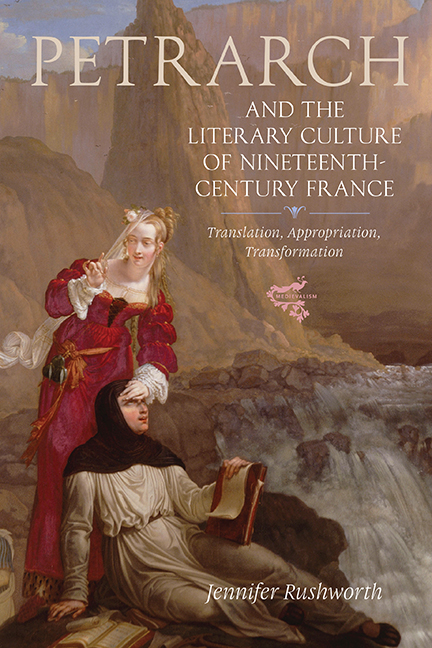 Petrarch and the Literary Culture of Nineteenth-Century France
Petrarch and the Literary Culture of Nineteenth-Century France Book contents
- Frontmatter
- Dedication
- Contents
- Acknowledgements
- Note on English Translations
- Introduction: Local History, Local Stories
- I Translations
- 1 Complete Translations of Petrarch's Canzoniere
- 2 Partial Translations of Petrarch's Canzoniere
- 3 Finding Laura in the Triumphi and Petrarch's Latin Works
- 4 Petrarch and Avignon: The Fate of the Sine nomine and RVF 136–8
- II Rewritings
- Conclusion: Petrarch and Patriotism
- Appendix 1 A Chronological Survey of Translations of Petrarch's Italian Poetry (the Canzoniere and Triumphi) between 1764 and 1903 in France
- Appendix 2 Translations of the Opening Stanza of RVF 126 from Voltaire (1756) to Brisset (1903)
- Bibliography
- Index
- Miscellaneous Endmatter
1 - Complete Translations of Petrarch's Canzoniere
from I - Translations
Published online by Cambridge University Press: 09 May 2017
- Frontmatter
- Dedication
- Contents
- Acknowledgements
- Note on English Translations
- Introduction: Local History, Local Stories
- I Translations
- 1 Complete Translations of Petrarch's Canzoniere
- 2 Partial Translations of Petrarch's Canzoniere
- 3 Finding Laura in the Triumphi and Petrarch's Latin Works
- 4 Petrarch and Avignon: The Fate of the Sine nomine and RVF 136–8
- II Rewritings
- Conclusion: Petrarch and Patriotism
- Appendix 1 A Chronological Survey of Translations of Petrarch's Italian Poetry (the Canzoniere and Triumphi) between 1764 and 1903 in France
- Appendix 2 Translations of the Opening Stanza of RVF 126 from Voltaire (1756) to Brisset (1903)
- Bibliography
- Index
- Miscellaneous Endmatter
Summary
THE NINETEENTH CENTURY is doubtless not a very important century for the translation of Petrarch in France’: so declared a comprehensive study of translations and translators in nineteenth-century France published in 2012. Such a view requires reconsideration, given the wealth of translations discussed throughout Part I and listed fully, as regards the Canzoniere and Triumphi, in Appendix 1. There are admittedly only a handful of complete translations into French of Petrarch's Canzoniere dating from the long nineteenth century. However, many more incomplete translations, often of isolated poems, were also published in this same period, as detailed in Chapter 2, not to mention translations of Petrarch's Triumphi and Latin works, the subject of Chapter 3. Nineteenth-century French translators of Petrarch are divided between a desire for completion (Chapter 1) and the enthrallment of incompletion (Chapters 2 and 3). The latter approach ultimately proves more popular, likely because it is more manageable in practical terms, whilst also giving the translator much freedom in deciding which poems to include. Throughout Part I, I focus on which works and which specific poems by Petrarch translators chose to translate, what version of Petrarch these choices privilege or construct, and what translators’ prefaces and other paratextual material reveal about attitudes towards Petrarch's writings during this period. The construction of a nineteenth-century French Petrarch was typically not achieved through a wholesale importation of the poet's writings into French, but rather through a process of refinement, curation, and selection for a specifically French public.
My analyses in Part I are less concerned with directly comparing original and translated text, an approach which typically runs the risk of treating the translation as inferior to or a failed version of the original, that is, as inherently ‘defective’. Instead, I privilege translations as worthy of interest in their own right, especially bearing in mind that only rarely were any of these translations published alongside the original texts, meaning that direct comparison of original and translation was typically neither encouraged nor facilitated. Before turning to specific translators and translations, it is useful first to highlight some general editorial problems relating to Petrarch's Canzoniere in this period, in particular as regards choice of title and the numbering and order of the work's constituent poems.
- Type
- Chapter
- Information
- Petrarch and the Literary Culture of Nineteenth-Century FranceTranslation, Appropriation, Transformation, pp. 33 - 50Publisher: Boydell & BrewerPrint publication year: 2017
